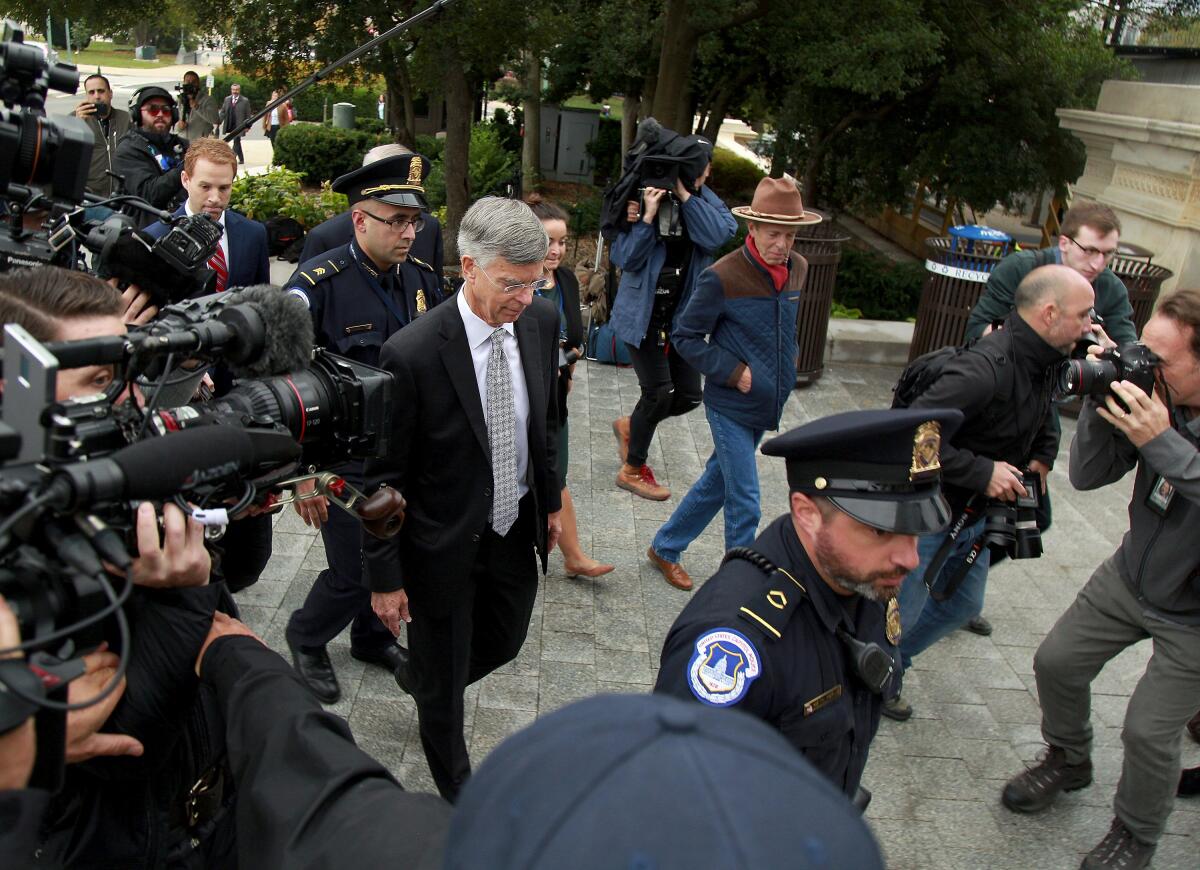The GOP is trying to distract you from key questions about Trump’s behavior. Don’t let them

- Share via
The House of Representatives’ impeachment inquiry moves into a crucial new phase Wednesday as the Intelligence Committee shifts to televised hearings, bringing witnesses who were deeply troubled by President Trump’s handling of Ukrainian policy into the public spotlight. Given that transcripts have been released of what the witnesses told the committee behind closed doors, there’s little mystery about what they’ll say now that the sessions will be in public. For the most part, the hearings won’t be about uncovering facts — they’ll be about putting the pieces of the Ukraine puzzle together into a story that more members of the public can see and readily understand.
If the private sessions held over the last few weeks are any guide, however, Trump’s Republican defenders will try mightily to shift the focus away from what Trump did in 2019 and onto what former Vice President Joe Biden and others did long before Trump took office. They will also continue to denounce the inquiry as biased, arguing that they should have more power to summon witnesses and that Trump’s lawyers should be allowed to participate.
Those narratives are circus sideshows, and their only purpose is to distract from the central question of this part of the inquiry: Did Trump abuse his powers as president to extort political favors from an ally in desperate need of millions of dollars in promised U.S. aid? The testimony released thus far paints a damning picture of Trump’s lawyer, Rudolph W. Giuliani, leading efforts to subvert U.S. policy to serve Trump’s personal interests, not the national interest. Those allegations need to be explored in greater depth over the weeks to come, as the House weighs whether to propose articles of impeachment.
The stakes are enormous, not just for Trump, his presidency and his party, but for House Democrats as well. Their credibility depends to some degree on whether the process strikes the public as fair to Trump, and Republicans are working overtime to persuade people that it is not.
Fairness is important, but it shouldn’t be measured by whether Democrats let Republicans steer the proceedings onto tangential topics, or whether Trump’s lawyers have a place at the Intelligence Committee table. It should be measured by whether Republicans are given the time and the freedom to question witnesses’ credibility and to present testimony and documents directly related to Trump’s conduct.
Keep in mind what the purpose of the committee’s effort is. These hearings are not a trial seeking to determine Trump’s guilt or innocence. That will happen later in the U.S. Senate, if the process gets that far. For now, the House is in the midst of an investigation triggered by Trump’s July 25phone call with new Ukrainian President Volodymyr Zelensky, in which he asked Zelensky to launch investigations that could burnish Trump’s political fortunes, and the subsequent efforts by the administration to cover up that request. The job of the Intelligence Committee is to find out as much as it can about who pushed for those investigations, what threats they made to persuade the Ukrainians to agree, and any subsequent moves by Trump or his aides to conceal what they had done.
Republicans are eager to deny that there was any pressure placed on Ukraine, despite the testimony of several witnesses that top Ukrainian officials were told that they would not receive nearly $400 million in desperately needed military and governmental aid — at a time when they were facing a grave threat from Russian-backed rebels — unless they committed publicly to conducting the investigations Trump wanted. It’s legitimate to question whether there was, indeed, an attempt to use the aid as leverage. But it’s not legitimate to argue, as some Republicans have maintained, that the attempt doesn’t matter because the aid was eventually released. “No harm, no foul” is an unpersuasive defense if the president abused the power of his office, even if it was to no avail.
The GOP also wants to send the witnesses down a couple of rabbit holes that might explain why Trump sought the investigations, but that don’t make his actions any more legitimate or acceptable.
One angle is based on the incredible conspiracy theory Trump clings to that Ukrainians were the ones meddling in the 2016 presidential campaign to help Hillary Clinton, not Russians meddling to help Trump. As former Trump national security aide Fiona Hill testified last month in response to a question from a GOP staffer, “If you’re also trying to peddle an alternative variation of whether the Ukrainians subverted our election, I don’t want to be a part of that, and I will not be part of it.”
The other angle is a similarly Lewis Carroll-inspired narrative suggesting that Trump wanted the Ukrainians to investigate Biden because he had interfered with anti-corruption efforts in Ukraine on behalf of his son Hunter, who served on the board of the controversy-dogged energy company Burisma. Never mind that Biden’s efforts in Ukraine pushed recalcitrant officials to do more to combat corruption, including replacing a prosecutor who had undermined a British investigation into Burisma, or that Biden was advancing official U.S. policy.
The relevant point here is that the administration withheld aid from a new Ukrainian administration that had been elected to clean up corruption, not from officials with any connection to the Bidens or the alleged meddling in the 2016 election.
The first two witnesses will be veteran foreign service officers who have firsthand knowledge of how the Trump administration conducted its Ukraine policy. Viewers should pay close attention to what they say about the message this administration delivered to Ukraine, and then ask themselves whose interests were being served — ours, or President Trump’s?
More to Read
A cure for the common opinion
Get thought-provoking perspectives with our weekly newsletter.
You may occasionally receive promotional content from the Los Angeles Times.









